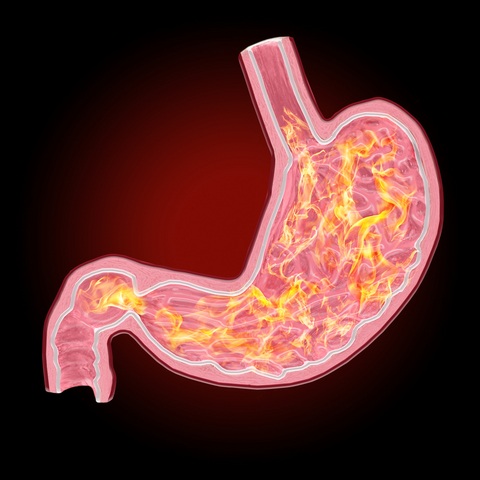Hydrochloric Acid: Improve Your Digestion

It’s possible you might be eating a healthy raw food diet and still be having absorption issues if you’re not producing enough Hydrochloric Acid.
What is Hydrochloric Acid?
Chemically speaking, hydrochloric acid is hydrogen chloride (HCl) in a water solution. It’s found naturally in our own gastric acid.
If your hydrochloric acid levels are up to par, you’ll experience good digestion and good nutrient absorption, and you’ll be protected from harmful pathogens and parasites. But if your HCL levels are low, you may show such symptoms as fatigue, hair loss, impaired digestion, candida, gastritis, slow healing and vitamin B12 deficiency and a host of other maladies. That’s how much HCL effects your health.
Importance of Hydrochloric Acid
Ample organic sodium in the stomach is necessary to protect stomach cells from hydrochloric acid. If that protection isn’t available, the body’s natural protection systems inhibit HCL production so as to protect the stomach lining.
As digestion uses up the stomach’s organic sodium, it begins ‘stealing’ needed sodium from elsewhere in the body. This can weaken muscles and even, over a long term, promote arthritis. Indeed, want of certain minerals—organic sodium among these—can mark the beginning of old age.
HCl is produced in the parietal cells of the stomach and is needed for the absorption of vitamins and minerals such as calcium, iron, folic acid and the B vitamins. Sufficient stomach acid is imperative for destroying certain microorganisms, bacteria, fungi and parasites.
Since raw food aficionados do not consume meat or many others of the foods whose digestion requires high HCL levels, we tend to produce less hydrochloric acid—we don’t need it, so our bodies make less. Should you decide to eat some cooked protein, watch out—it could create digestive issues due to insufficient stomach acid. Hydrochloric acid is essential to digestion, especially when it comes to large protein molecules.
Ways to Ensure Adequate HCL Production
If you want to ensure adequate HCL production, or increase production, you can go about this in a few ways.
Consuming adequate organic sodium is essential. Celery is a great way to get organic sodium. Include it liberally in your diet, especially in vegetable juice. Wheatgrass is also extremely high in organic sodium. Seek out other sodium-rich foods, too, such as any of the sea vegetables, aloe vera, or barley grass juice.
Chew. Chew well. I can’t stress enough that proper chewing is of utmost importance for raw foodists. Since we don’t have as much HCL as others, we must chew our food well. This is where the value of blended raw foods—green smoothies, especially—comes into play. By consuming green smoothies daily, you’re assured of obtaining more greens and fiber as well of having your food completely broken down for proper digestion and assimilation. There are many raw foodists who were not able to overcome their health challenges or put on desired weight until they dramatically improved their levels of HCL. This is an important tip—don’t overlook it!
If you do have digestive problems, it might well be in your interest to look into colonic hydrotherapy and boosting HCL levels with either temporary supplementation or some of the methods I mentioned above.
The information I’m giving here is for educational purposes only. Do consult your own health care professional.
Be sure you’re not deficient in B12. A B12 deficiency may be directly related to your body’s ability to produce sufficient hydrochloric acid in your stomach. Read more about B12 here.


